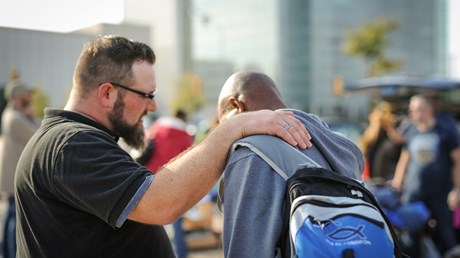Simon Cox Blog
Wednesday, 24 April 2019
Abandoned Religion: The Burning Pillar Of Human Folly
from
https://www.patheos.com/blogs/tippling/2019/04/24/abandoned-religion-the-burning-pillar-of-human-folly/
Tuesday, 23 April 2019
1 Peter 1:18-19
from
https://www.biblegateway.com/passage/?version=NIV&search=1%20Peter%201:18-19
Six Biblical Responses to Sri Lanka’s Easter Bombings
God gives us the freedom to leave the revenge cycle and instead do what we can do: love our enemies and bless them.

I was not at church in Colombo on Easter Sunday morning, as I was sick and had stayed home. Then text messages began to come about a bombing, then several bombings, in my home town and in two other towns. One was only a few miles from my home.
Ten years after our protracted war had ended, I realized that Sri Lanka, my dear nation, was again confronting severe violent attacks. I had preached several times in one of the targeted churches, Zion Church in Batticaloa. The sister of one of my colleagues was at the service, and was seriously injured. She is still battling for her life. The death toll has risen to 320. Unbelievable.
Whenever tragedy hits a nation, Christians need to ask how to think biblically in response to the situation. As Christianity is a body religion, it is best that groups of Christians meet and discuss a common response to the challenges. We cannot delay our response. There are both immediate responses and more long-term responses to heal the wounds of our people.
I have thought of at least six necessary responses from Christians to what has happened:
1) Lament Loss
Christians must join the nation in lamenting and mourning over our losses. Protestants have been somewhat lacking in espousing a theology of groaning (Rom. 8:23) that opens the door to lament (though that seems to be changing). The Old Testament has many instances of elaborate mourning customs, and that is found in the New Testament too. The church responded to Stephen’s death with a “great lamentation over him” (Acts 8:2; also see 9:39). Each country has its cultural ways of lament, and we must look for practices to adopt which harmonize with Christianity. In addition to Easter time, April is New Year in Sri Lanka and most Christians ...
from
http://feeds.christianitytoday.com/~r/christianitytoday/ctmag/~3/gzgn6phUp2I/sri-lanka-easter-church-bombings-biblical-response.html
Evangelism Is More Prayer Than Action for Protestant Churchgoers
Survey finds more than half of monthly worshipers haven’t shared Jesus in the past six months.

Most Protestant churchgoers say they are eager to talk to others about Jesus, and are praying for opportunities to share their faith. But most say they have not had any evangelistic conversations in the past six months.
The 2019 Discipleship Pathway Assessment study from Nashville-based LifeWay Research found excitement and eagerness about the idea of evangelism, but few Protestant churchgoers actually engaged in the practice on a regular basis.
More than half (55%) of those who attend church at least once a month say they have not shared with someone how to become a Christian in the past six months.
“Sharing the good news that Jesus paid for our sins through His death on the cross and rose again to bring us new life is the mission of the church,” said Scott McConnell, executive director of LifeWay Research, “but it does not appear to be the priority of churchgoers.”
Seeking evangelistic opportunities
A majority of churchgoers (56%) say they pray for opportunities to tell others about Jesus at least once a week, with about 1 in 4 (23%) praying for such moments every day.
Another 1 in 4 (27%) say they rarely or never pray for those opportunities.
Those with a high school diploma or less are most likely to say they pray for those opportunities every day (31%).
Hispanics (36%) and African Americans (29%) are more likely to offer those prayers every day compared to whites (20%) or other ethnicities (17%).
Increased church attendance makes it more likely someone has offered evangelistic prayers.
Those who attend a worship service on average once a week (75%) are more likely than churchgoers who attend less frequently (69%) to pray evangelistically at least once a month.
Most churchgoers (56%) also say they are eager ...
from
http://feeds.christianitytoday.com/~r/christianitytoday/ctmag/~3/BP4puSAmq5U/evangelism-survey-protestant-churchgoers-prayer-invite.html
When Our Ultrasound Revealed a Birth Defect, My Doctor Offered an Abortion
We've never regretted saying no, but his words still haunt me.

I was a little over halfway through my pregnancy when my husband and I sat gripping each other’s hands while a specialist gesticulated as he described the options for our unborn baby. We could opt for life-saving surgeries, we could give her comfort care once born but allow her to die without intervention, or we could choose to abort.
“The root of [the word] disaster means a star coming apart, and no image expresses better the look in a patient’s eyes when hearing a neurosurgeon’s diagnosis,” says the late Paul Kalanithi in When Breath Becomes Air. A star coming apart perfectly describes how it felt to be told that our daughter had a severe heart defect that would kill her soon after birth without medical intervention.
When the word abortion was brought into the conversation, my hand involuntarily reached out in a painful appeal to leave that option off the table. He brushed my objection aside, “I know that many parents don’t want to hear about this option, but I legally have to tell you.” He continued describing what abortion would look like in some detail, then the medical team melted off into the hospital.
This moment has haunted me for years, and it has come to mind as pro-choice and pro-life positions are again debated in many states, much of the argument being over “nonviable pregnancies” or “medically fragile fetuses.” Some of the debate surrounding new bills and legislation is over what it looks like to show compassion to parents and to unborn babies when faced with serious, life-threatening birth defects. A baby with any birth defect—life threatening or not—challenges us personally and as a society to examine what our values are. The ...
from
http://feeds.christianitytoday.com/~r/christianitytoday/ctmag/~3/dK_7rw_j-q0/when-our-ultrasound-revealed-birth-defect-my-doctor-offered.html
Theology of the Future
Bible scholars, theologians, and philosophers used to work together. N.T. Wright believes they need to do so again.

Stop thinking like children.” Paul’s admonition to the Corinthians is even more urgent for us today. Though they should be like little children when it came to evil, he insisted they should be grown-ups when it came to thinking. To that end, Paul constantly tried to teach people not only what to think but how to think. This remains vital. The various disciplines grouped together as “theology” or “divinity” are uniquely positioned to continue this project.
People today often comment about the decline of civil, reasoned conversation in all walks of life. Theology has an opportunity to model a genuinely interdisciplinary conversation of the sort we urgently need, not least because in its very nature it ought to bridge the gap between the academy and the larger world.
The great theologians of the past—such as Augustine, Aquinas, Luther, and Calvin—all tried to bring the Bible, philosophy, and theology into a shared conversation. As each of these fields advances, they need one another all the more.
The Challenge of Our Time
Despite what cynical critics think, the Christian faith is growing and expanding. The Pew Research Center estimates that there will be 3 billion Christians by 2050, most of these in countries with little opportunity for further or higher education and minimal seminary provision. But without rigorous theological study, in its widest senses, the global church will be vulnerable to distorted or lopsided teaching. In particular, it will not be equipped to address the big questions that the wider world is asking and that emerge in new forms with every generation and every cultural shift.
Those familiar with some of the more negative theological writing and biblical scholarship ...
from
http://feeds.christianitytoday.com/~r/christianitytoday/ctmag/~3/Rt_TLeljfAU/n-t-wright-theology-of-future.html
Lost in Translation: Lessons from Language Can Help Us Share the Gospel
Every generation has to figure out how to engage and reach people in culture. Translation and immersion are key ideas that will help..

In my leadership role with World Methodist Evangelism, I frequently am in international environments, depending heavily on the skills of translators and interpreters. These are gifted people!
I recall teaching on evangelism in Vladivostok, Russia a few years ago. I was trying to make an important point, which in English is not difficult to understand. It’s the idea that in evangelism, no way is the way, but each way, by God’s grace, can become a way. The emphasis is on the word “the”(which implies a sense of singularity) and the word “a” (which implies a variety of possibilities).
The point is that there is never only one way to evangelize; rather, there are a wide variety of fruitful approaches, depending on your environment.
What I didn’t realize is that in Russian, there is no easy way to translate “the” and “a,” especially to make the point I was trying to make. It took a few minutes of discussion with my interpreter, along with a much longer explanation in Russian, to finally make that one sentence clear.
In our life of faith, translation is critical.
How do we understand this good news of Jesus Christ? How is it that we make it known to others? How do we translate this news that is at one and the same time something that inspires silent awe, joyful praise, tearful repentance, ecstatic utterances, or quiet prayer?
How do we make known a gospel that is at one and the same time something that moves us to a life of personal piety, acts of mercy, or public activism? How do we provide a channel for the Holy Spirit to make this deeply mysterious yet magnificently understandable news real in all places and for each successive generation?
There is nothing new about ...
from
http://feeds.christianitytoday.com/~r/christianitytoday/ctmag/~3/SDIP8sGv63o/lost-in-translation-language-evangelism-living-word.html